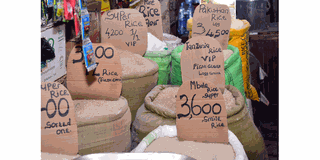How prepared are we for the dry spell?

Price tags on food items in a shop in Kampala last week. Food and other commodity prices have been on the rise in the last couple if months. PHOTO/MICHAEL KAKUMIRIZI
What you need to know:
The issue: Dry spell.
Our view: The most important element is government preparation. Citizens can do so much to prepare for this spell but many times the situation is beyond their control
This newspaper reported yesterday that weather experts had predicted a dry spell that will span about five months from October.
That then means, without irrigation schemes or valley dams, many areas will face water scarcity.
The immediate effect will be limited growth of crops, lack of pasture for animals after about three months from now, and inadequate water for domestic use.
That also means there will be little agricultural produce in markets, triggering an extended high cost of commodities and expensive standard of living.
Already, the fuel prices combined with global occurrences such as the Russia-Ukraine war has made some commodities out of reach for average income families.
The floods from the concluding rainy season have rendered many families homeless and without food. A dry spell would just inflict more pain. As late as July, we reported that the cattle corridor experienced the longest dry spell this year, rendering many farmers helpless as they watched their crops wither and animals yearn for water.
The cattle corridor stretches from Isingiro District in southwestern Uganda to Karamoja in the northeastern part of the country, dominated by pastoral rangelands. They include Kiruhura, Nakasongola, Luweero, Nakaseke, Kiboga, Mubende, Sembabule, and districts in Teso Sub-region.
Now the latest warning should get us prepared. What lessons have we learnt over the past few years as climate change effects pound us?
For farmers, we can offer a few solutions. We need to shift to crops that do not need a lot of water to grow, and also plant those that are extreme weather resistant.
We also hope that farmers have stored some water from rain to help them in times of need a few months from now.
Weather experts have also advised farmers to use the current rains to plant short-term maturing crops that will sustain them during the next five months of the looming dry spell.
For those rearing animals, it is very important to have some sort of dams where animals will drink water from when the sun comes blazing. For those that can afford, this is the time to prepare silage.
For homes, do we have enough stock of long-lasting foodstuff? Some communities dry cassava, bananas, sweet potatoes, etc in preparation of the ‘hunger period’. We encourage families to store food if they have.
The most important element is government preparation. Citizens can do so much to prepare for this spell but many times the situation is beyond their control.
Has the government prepared for this, seeing the plight of Karimojong? We hope in the affirmative.
Our commitment to you
We pledge:
- To be accurate and fair in all we do.
- To be respectful to all in our pursuit of the truth.
- To refuse to accept any compensation beyond that provided by Monitor Publications Ltd. for what we do in our news gathering and decision-making.
Further, we ask that we be informed whenever you feel that we have fallen short in our attempt to keep these commitments.




